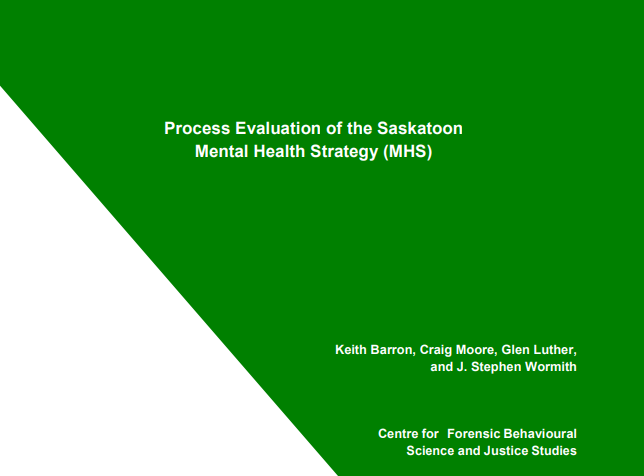
Process Evaluation of the Saskatoon Mental Health Strategy (MHS)
The analysis is broadly broken down into three sections: strengths of the MHS, areas for improvement, and recommendations. This overview outlines the major themes from each section and provides a summary of the findings
By Keith Barron, Craig Moore, Glen Luther, and J. Stephen WormithThe deinstitutionalization of the mentally ill in Canada during the 1950s and 1960s involved a transition of mental health resources from institutional settings to community-based care. Initially hailed as a means to liberate individuals from the confines of outdated institutions and to streamline public expenditure, the swift reduction in dedicated facility beds left local communities ill-prepared to adequately support those with mental health needs. Lacking essential professional support, individuals found themselves increasingly susceptible to a myriad of challenges including homelessness, poverty, and substance abuse. Additionally, the lack of sufficient community resources precipitated a surge in interactions between mentally ill individuals and the criminal justice system, leading to a notable escalation in incarceration rates. This phenomenon is often characterized as a "revolving door" scenario wherein mentally ill offenders become ensnared in a cycle of legal entanglements fueled by underlying socioeconomic disparities and difficulties in adhering to legal mandates.
Strengths of the MHS
- Overall positive attitudes towards the MHS
- Ample time spent on individual files
- Participant “buy-in” and commitment is better in the MHS
- MHS improves legal effectiveness
- Fostering inter-agency communication
- Realistic expectations
- The MHS is an evolving program that is improving over time
Areas for Improvement
- Docket Size
- The need for additional sessions or more frequent dockets
- Need for a Coordinator or Point Person
- Length of time to progress through the MHS
- Concerns about public safety
- Requests for additional training
Conclusion
In the process of compiling this report, the research team has had an opportunity to look behind the scene to examine how individuals with mental health conditions fare in our justice system. Many strengths of the MHS were identified, and several areas for improvement were highlighted. If the MHS can secure a coordinator and deal with the concerns surrounding docket sizes, most other issues can be addressed with strong communication between MHS team members and some creative thinking.
Future research is being organized for the years ahead to gather more quantitative data with an eye towards client outcome on various measures including recidivism and quality of life indicators. As noted in the methods section, this current evaluation is of a formative nature and was not designed to make any decisive comments about the success of the MHS as this would require gathering data over a prolonged time frame and comparison data from a non-mental health court in Saskatoon to draw any valid conclusions.
Additional research might also include an investigation into the MHS referral process to determine how clients are ending up in the MHS, and if any individuals with mental health conditions are still “falling through the cracks” by not connecting with the MHS even after they enter the Saskatoon Provincial Court. Furthermore, research into the specific kinds of mental health conditions most frequently encountered by the MHS and strategies specific to those conditions could be fruitful.
We hope, given the limitations, this report is still helpful for decision makers and those steering the MHS. Our interviews and statistical data suggest that the MHS represents a positive innovation for the City of Saskatoon. It is meeting the expectations of participants and satisfying those involved with the MHS, while diverting participants with mental health concerns and cognitive impairments to address their needs. While the MHS process is functioning well, it requires some realignment in order to continue to meet the needs of MHS participants in Saskatoon

